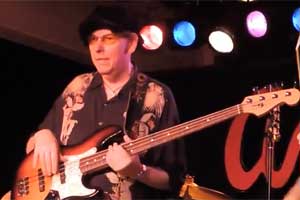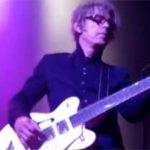Double Trouble bassist talks to FBPO about his long association with Stevie Ray Vaughan and the band’s upcoming induction into the Rock and Roll Hall of Fame
Exclusive interview with FBPO’s Gary Graff
February 9, 2015
Tommy Shannon doesn’t own a tuxedo — and doesn’t plan to buy one for his Rock and Roll Hall of Fame induction this April. That’s okay, though; the finery wouldn’t really suit the gutbucket but virtuoistic brand of blues-rock Shannon played as part of Stevie Ray Vaughan & Double Trouble — which, rest assured, was a band even though the guitar whiz’s name was out front. “Stevie used to say to people, ‘These guys aren’t a backup band. They’re my family,’” remembers drummer Chris Layton, Shannon’s partner in rhythm section crime in Double Trouble and, afterwards, in the bands Arc Angels and Storyville. “Many people don’t know we were a band five years before we made our first record. Tommy and Stevie had worked together years earlier in a couple of other bands, but we’d all known each other a long time and we had this band for quite awhile and it was always Stevie Ray Vaughan and Double Trouble.”
Double Trouble, which later included keyboardist Reese Winans, was so good that Vaughan turned down an offer to be part of David Bowie’s Serious Moonlight Tour band in order to keep the group going — which resulted in a run of four studio albums, the incendiary Live Alive and a series of vault releases that followed Vaughan’s death in an August 27, 1990 helicopter crash.
The Tucson-born Shannon (nee Smedley) and Layton did record one more Double Trouble album, the guest-filled Been A Long Time in 2001, and in addition to his work with Layton, the Fender devotee has also toured and recorded with Kenny Wayne Shepherd and Jimmy D Lane and currently resides in Austin, where he plays in the band 86.
FBPO: You’re going to be a Rock and Roll Hall of Famer. How does it feel?
TS: It feels great. It’s one of those things; you’re not sure if it’s ever going to happen, but now that it has it’s really good. It’s about as high a compliment as you can get.
FBPO: Was the Rock Hall on your radar?
TS: Sure, but I didn’t know if we’d get in, to be honest. I wanted to be part of it, but I guess deep down inside I didn’t think we would be. But now that it’s happened, it’s a pretty good feeling. We’re all excited about it.
FBPO: Any idea of what you guys will do at the ceremony? There is, sadly, no Stevie Ray to play with.
TS: I’m not sure yet, but I think Jimmie Vaughan and Doyle Bramhall and Gary Clark Jr. are gonna play with us and we’re gonna do three songs – I’m thinking probably “Texas Flood,” “Crossfire” and I’m not sure about the third one. And I think that’s about all we have planned. They have a jam at the end, but I’m not sure who’s gonna be playing then.
FBPO: What will the emotion of playing those songs on that night be like for you?
TS: Well, we’ve been doing those songs from time to time. It’ll be great. It always is.
FBPO: What do you think accounts for the enduring appeal of Stevie Ray Vaughan & Double Trouble?
TS: It’s the music that doesn’t go away. It’s relative to all time periods. Some bands have a hit song and then a year later nobody remembers them. But if you have something real, real music that reaches down and touches people, it sticks around.
FBPO: How did Double Trouble come together?
TS: Well, I met Stevie when he was about 15 years old. I was playing with Johnny Winter at the time and we broke up. (Vaughan) was playing at this club in Dallas and I went to see him play and we became friends that night. We played in a band after that called Blackbird and we played in another band called Crackerjack and then kind of went our separate ways. And in 1979 I saw in the papers that Stevie was playing at this club, Rockefeller’s, in Houston. So I went down to see him and I walked in the door and, I’ll never forget this, it was like this beam of light went right through me and I said, “That’s where I belong, right there, playing with Stevie.” He took a break and I went up and told him, “I belong playing with you” and we got up and had a jam session and it worked out great, and he called me two weeks later to join his band.
FBPO: What was it you heard in Stevie that was so special, especially as young as he was when you first heard him?
TS: You could tell he was special even at 15 years old. I remember we were outside the club and a bunch of us were talking, and you know how something musically with catch your attention? His guitar pierced through everything. I went inside and there was Stevie, a little kid, but he just had something special. Everybody who heard him thought he was special. And he was very humble about it; he didn’t put himself on a pedestal or anything. He was still really respectful of the older guys, the older musicians who were playing around.
FBPO: It’s important to note, though, that it was always Stevie Ray Vaughan and Double Trouble. He always seemed to consider it a band, and himself a part of the band.
TS: Yeah, we were more like a family than a separated band. We did everything together. Stevie always wanted Double Trouble to be on the marquee or whatever. In interviews or anything like that it was always Double Trouble. He felt more comfortable that way.
FBPO: How would you describe your role or the role of the bass in Double Trouble?
TS: Well, that’s hard to say. My bass playing just felt good with what Stevie was doing. I played better when I played with Stevie. We all played better when we played with each other ‘cause we were all such good musicians. I don’t really know how to answer that, just that I fit in with Stevie.
FBPO: Do you have favorite songs?
TS: Sure – “Texas Flood,” “Crossfire,” “Little Sister,” “Better Leave My Little Girl Alone” — the Buddy Guy song. There’s several of them, really.
FBPO: There was a lot of diversity in Double Trouble’s repertoire, too. It was always blues and rock at its core, but there were a lot of other flavors you guys worked into the mix.
TS: Well, on our records we always tried to put one real slow one, like “Riviera Paradise” and “Lenny.” We always tried to put something real mellow on there so we wouldn’t be pigeonholed as strictly a loud rock band or blues band. We’d always try to bring our tone down so there was some variation to it.
FBPO: How did you wind up playing bass?
TS: I started out on guitar and we didn’t have a bass player, so I started playing bass for awhile and started liking it better ‘cause I was frustrated with drummers, so I just started playing bass.
FBPO: You’ve just made a whole lot of enemies, my friend.
TS: [Laughs] Y’know, I was about 20 years old at the time and it seemed like all of our drummers did things I didn’t like — the kick drum would be in the wrong place, or the snare. I just got frustrated with that. Being the bass player you’re part of the rhythm section and, to a certain degree, you can change that by just your playing. I always felt like I was laying the bed underneath everything that everybody else could stand on. It was really a welcome change. I liked it a lot.
FBPO: Always a Fender guy?
TS: Yeah, pretty much so. That’s all I ever played. I bought my Jazz bass, the one I have now, for $125 back in ‘66. I just liked Fenders and never saw a reason to switch.
FBPO: How did you wind up playing with Johnny Winter?
TS: It’s weird. I met Johnny and Stevie at the same time, at The Fog in Dallas, Texas. I was playing with Uncle John, Johnny’s drummer; we were playing in Dallas and Uncle John quit and moved to Houston with Johnny. They started playing and they had a bass player, but he flipped out or something like that. So Uncle John brought Johnny to Dallas and Johnny liked the way I played, so he asked me to join the band and I did. I’ll never forget when Johnny walked in the club. I’d never seen an albino before; he looked like some kind of Greek god with the white hair, the pink eyes, skinny, just playing his ass off. It was an experience.
FBPO: Can you compare and contrast playing with Johnny and playing with Stevie Ray?
TS: Well, they were both different. Johnny was more into the old country blues and Stevie was more into electric blues, for one thing. But as far as who’s better, they’re both great. They’re just different.
FBPO: You got a taste of the big-time with Johnny. Did that help when Double Trouble took off during the ‘80s?
TS: Yeah, it did. Going through all that in 1969, I had more of a professional view of things and I did help (Double Trouble) because they had never been through that. I had a lot to do with helping the band form the direction and everything.
FBPO: You got to play Woodstock, too. Remember anything?
TS: Man, we didn’t know how big it was going to be. They had to fly us in helicopters because it had been raining and no vehicles could get there. And I remember from the sky looking out over this ocean of people. It was just unbelievable. I had never seen that many people in my life. We didn’t know it was going to be that big until we got there and we looked down from these little bubble helicopters. It was really amazing.
FBPO: And the gig itself?
TS: Not really, man; [Laughs] that’s been about 45 years ago, something like that. I remember we were, like, eight hours late going on because they were running behind. It was a great experience.
FBPO: What was it like to audition for the Rolling Stones back in the early ‘90s?
TS: Well, there was, like, 17 bass players they auditioned. When they called me I was blown away. I sat down and learned every one of their songs, which didn’t take long ‘cause I knew ‘em all anyway. I remember going there; I was really nervous and I went in and it was real relaxed and they were really cool guys, just down to earth guys. It sounded great. It was supposed to be 45 minutes and we went for about an hour and it went really great. If I’d have gone there and bombed, I’d have to live with that for the rest of my life, but it went really good so I can remember that.
FBPO: If Stevie Ray had lived, what do you think he and the band would be up to now?
TS: We’ve speculated on that a lot, because towards the end there, when In Step came out, Stevie and I had gotten clean and sober and we started growing differently. We started more band contributions. We all started writing. We already had some songs for our next record. We were on the way up again, like a second spurt of energy came along. I have no idea what we’d be doing now, but I know it’d be really good.
FBPO: What do you think Stevie would make of getting into the Rock Hall?
TS: He’d be very grateful. He’d also be grateful that we’re going to be there to accept it. He was a really beautiful person.








Great interview Gary. Thank you.
Wonderful interview. Listening to Tommy on Second Winter influenced my bass playing ever since. He’s my favorite player.
Great interview of a bassist that has influenced all of us. A champ of beat placement, cool he touch on that.